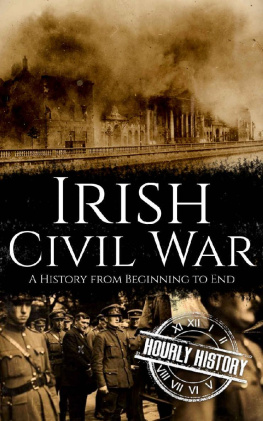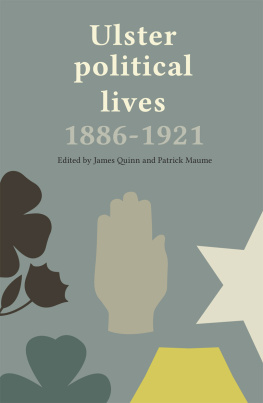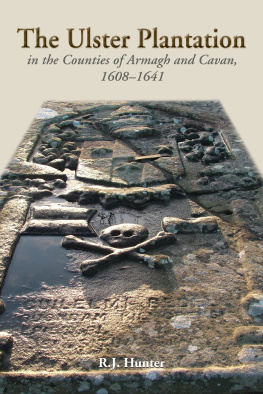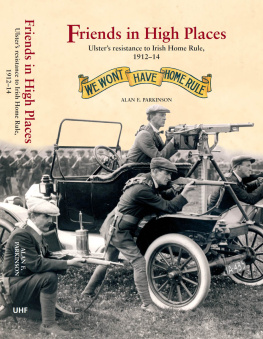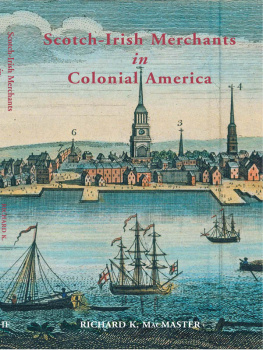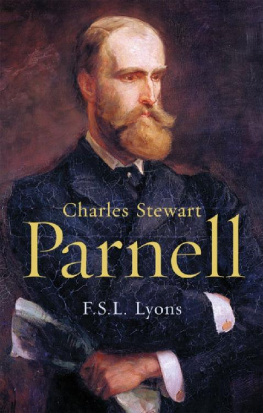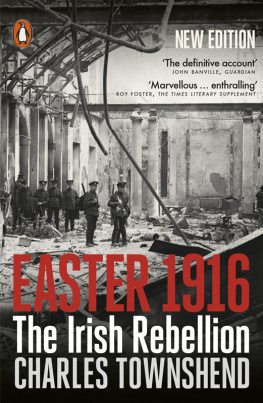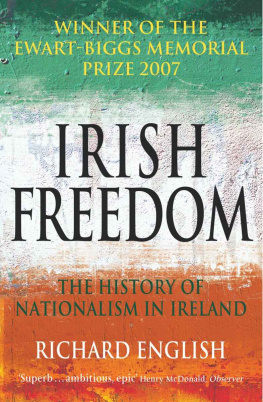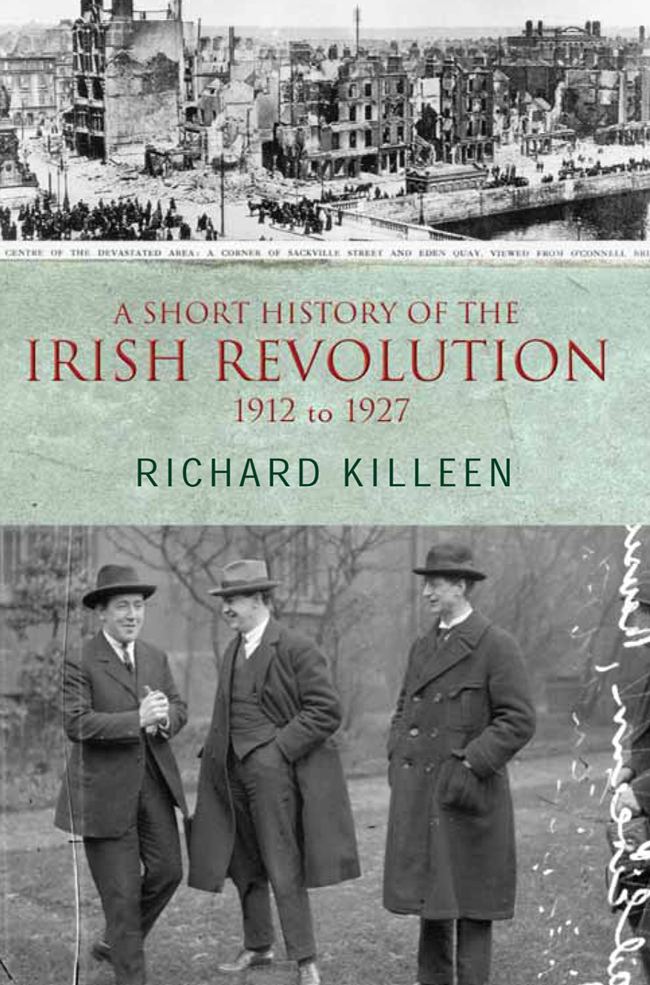A SHORT
HISTORY
OF THE IRISH
REVOLUTION
1912 TO 1927
RICHARD KILLEEN
Gill & Macmillan
Contents
T he Irish Revolution started in London. Twice in the late nineteenth century, William Ewart Gladstone had sponsored an Irish Home Rule Bill in parliament. The most potent political figure of his time, he had nevertheless failed on both occasions. In 1886, the first bill failed in the House of Commons when his own Liberal Party split on the issue. The second bill, in 1893, passed the Commons but was predictably defeated in the House of Lords.
The House of Lords was one of those peculiar British institutions that made little sense in terms of modern assumptions: it was shamelessly elitist and anti-democratic in what was an ever-more democratising age. It represented privilege, both ancient inherited privilege and that more recently acquired through industrial fortunes. Lordships were created anew as well as inherited. Constitutionally, the House of Lords was the upper house of parliament, a revising chamber which in theory acted as a brake on the more frantic initiatives of the Commons. As was pointed out repeatedly, however, it discharged this function only in respect of bills sponsored by Liberal governments, which it cheerfully emasculated as it thought fit. On Tory legislation, its revising hand palsied.
By the time H.H. Asquith became Liberal Prime Minister in 1908, the House of Lords was nothing more or less than a Conservative barrage, whose sole purpose was to frustrate what it regarded as Liberal legislative excess. The problem for the Lords was that Asquiths government had been elected in one of the biggest landslides in British electoral history. In 1906, the Liberals swept back to power after almost twenty years in the political wilderness. Their leader, Sir Henry Campbell-Bannerman, became Prime Minister and appointed Asquith as Chancellor of the Exchequer. In that position, Asquith displayed the calm assurance that had distinguished his entire career. He introduced old age pensions and other reforms that pre-figured the Welfare State. When Campbell-Bannerman died, Asquith was his unchallenged successor as leader of the party and Prime Minister.
But just why had the Liberalsthe party of Gladstone that had completely dominated mid-Victorian politicscome to spend twenty years squabbling with each other on the opposition benches? As always, there were many causes, but none was more central than home rule for Ireland. The split that Gladstone caused by this measure was, more than anything else, responsible for the Liberals wilderness years. Asquith had first entered parliament in the fateful year of 1886. His whole parliamentary career had therefore overlapped with this period of Liberal decline and division. Unlike Gladstone, Asquith was not a force of nature inspired by high moral ideals. He was a temperate lawyer, wonderfully competent and able. He was shrewd. And like any shrewd Liberal of his era, he remembered all too well the havoc that home rule had brought to his party. In his heart Mr Asquith resolved that here was an issue best avoided.
Not that it was an issue at all in 1908. On the opposition benches in the Commons there sat the members of the Irish Parliamentary Party, the heirs of Parnell. Their numbers were insufficient to influence the governments majority and consequently they could be ignored. The government did introduce an anodyne measure called the Irish Council Bill in 1907, to offer Ireland a very limited form of devolution well short of home rule. It proved far too pallid for the various shades of Irish nationalismincluding the IPP and it was withdrawn.
Their Lordships were growing ever more alarmed by what was coming from the Commons. After a generation of nodding through Conservative measures, they were suddenly galvanised by Liberal legislation. Bills to do with education, plural voting and licensing were all thrown out in the Lords. The Liberals, invested with the legitimacy of a democratic landslide in the Commons, were powerless against their Lordships naked partisanship.
When Asquith became Prime Minister, his successor as Chancellor was David Lloyd George. Lloyd George was a radical, on the left of the party. He was mercurial and torrentially eloquent. As a small-town Welsh solicitor of an aggressive disposition, he had no love at all for the landed interest that dominated the Lords. In preparing his 1909 budget, he was faced with a large deficit which he was determined to make good. The deficit was caused by increased military spending and by the cost of Asquiths old age pensions. To finance all this, Lloyd George increased income tax and death duties, taxed undeveloped land and mining royalties and imposed heavy duties on the licensed trade, a traditional Tory redoubt. He introduced a super tax on the very rich for the first time. If Lloyd George had set out to select a series of targets designed to infuriate the Tories generally and the House of Lords specifically, he could hardly have done better.
By constitutional convention, the Lords did not reject money bills. Yet here was a money bill that represented a direct assault on their interests, coming at a time when they had grown accustomed to a more assertive use of their veto. After much manoeuvring and agonising, the Lords rejected the Peoples Budget and tripped off a constitutional crisis.
The two general elections of 1910 were required to resolve it. Twice Asquith went to the country and twice he was returned. Only when he threatened to create enough new peers, all of whom would be safe Liberal placemen, to swamp the existing Tory majority, was the budget finally passed. From this, it was a short legislative step to the Parliament Act of 1911, which finally abolished the Lords veto, replacing it by a mere power of delay.
The two general elections had, however, caused the configuration of the Commons to change decisively. Asquith had won, but his majority had disappeared and he now found himself, as Gladstone had found himself twenty-five years earlier, depending upon the Irish Parliamentary Party for a secure majority. The IPP was happy to oblige. The condition was obvious. When all was said and done, they were a one-issue party and the issue was home rule. The measure that Asquith least wanted to touch was the one he was made to embrace.

Since the 1880s, in every test of political opinion in Ireland, home rule had produced an overwhelming majority. These were reasonably true tests, for a major franchise reform in 1884 had effectively brought all male heads of households in the UK onto the electoral register. There was only one blemish in the image of an Ireland solid for home rule: Ulster.
Ulster, the northern province comprising nine counties, was alone in Ireland in not having an overwhelmingly Catholic population. The province was almost evenly divided between the denominations, although there was a small Catholic majority. The eastern half of Ulster, however, was solidly Protestant. This included the two coastal counties of Antrim and Down and the great industrial city of Belfast. As one pushed west from this heartland, however, Protestant numbers weakened although still able to command local electoral majorities in many areas. The two most southerly Ulster counties, Cavan and Monaghan, and the most westerly (ironically, also the most northerly), Donegal, contained very substantial Catholic majorities.
Catholic meant nationalist and pro-home rule. Protestant meant unionist and anti-home rule. It really was as simple as that. The few exceptions here and there were of no account and statistically insignificant. Irish nationalism was an overtly Catholic project and Irish unionism a Protestant one. There was some small support for unionism among a tiny minority of southern upper-middle class Catholics, but in Ulster the overlap between confessional allegiance and political allegiance was nearly total.


